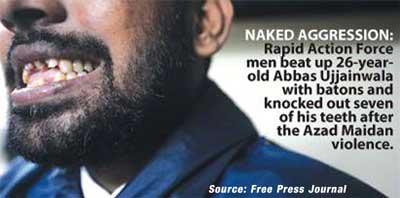
Mumbai Police earned laurels for its restraint at Azad Maidan but bared its ugly face inside police stations and Arthur Road jail with the youth arrested in the wake of the rioting at the Maidan. One of its victims is 26-year-old Abbas Ujjainwala who was picked up by the cops for no rhyme or reason and seven of his teeth knocked out. Later, CCTV footage established that he was in Kurla at the time riots erupted at Azad Maidan.
According to a report in Free Press Journal (29 August), on August 11, it was not just the rioters who behaved like hooligans but the law enforcers too behaved like rioters, going on mindless rampage of their own and breaking seven teeth of a young boy who wasn't even part of the riots. The Rapid Action Force beat up 26-year-old Abbas Ujjainwala on the night of August 11 when he went to Azad Maidan looking for a friend. Abbas, who was at home when the riots took place early in the evening, had gone to Azad Maidan at 9:30 PM after the riots stopped, to look for his friend who hadn't returned from the protest meet.
On seeing him, the RAF men thrashed him with batons, knocking out seven of his teeth. He was arrested and, incidentally, acquitted by the court on 28 August. A CCTV installed in Taxi Mens Colony, Kurla, where he resides, came to his rescue. The footage showed Ujjainwala shopping near his house at the time vandals were wreaking havoc at Azad Maidan.
Apart from Abbas, three more acquitted youth were beaten black and blue by the RAF and the Arthur Road Jail authorities before being set free nearly 14 days later. All the 23 accused, who were acquitted owing to lack of evidence, were to be sent for an immediate medical check up after Advocate Khalid Azmi filed an application on 25 August on behalf of their family members stating that they d were beaten up in Arthur Road Jail. Abbas said he was verbally abused and threatened by the Arthur Road Jail authorities. 'I was beaten up in such a manner that they left no visible injuries on my body. They mostly assaulted us with punches and kicks,' Abbas added.
Another acquitted youth, Anees Dawaray (23), a garage mechanic, also said the police at Arthur Road jail beat him up. Aslam Ali Shaikh (19), a FY B.com student at MD College in Dadar, who was also wrongly picked up by the police on the eve of the riots, has a harrowing account to narrate. 'Immediately after releasing me from Taloja jail on 28 August, I had to be rushed to a private nursing home for dressing of wounds. I can barely walk. They beat me on my legs with a stick at Arthur Jail Road,' said a visibly shaken Shaikh.





Comments
Add new comment